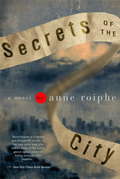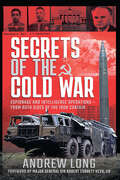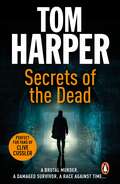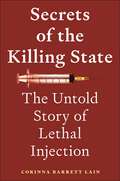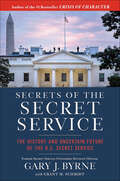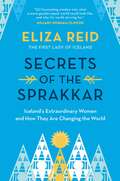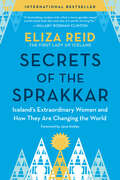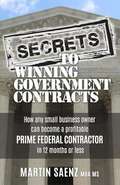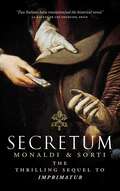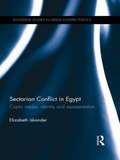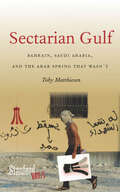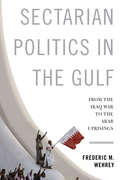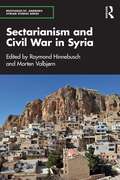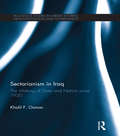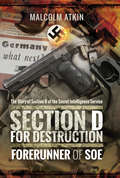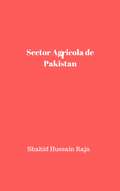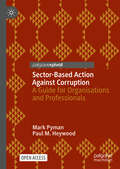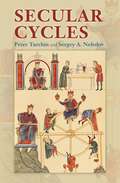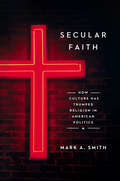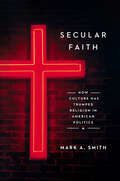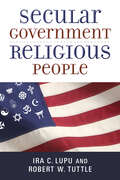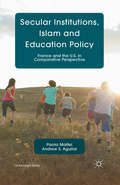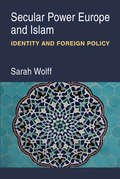- Table View
- List View
Secrets of the City
by Anne RoipheSecrets of the Cityis celebrated author Anne Roiphe’s brilliant novel about a big-city mayor and the struggles that shape the fortunes of his city, the life of his family, and the condition of his soul. Mel Rosenberg is the mayor of a city uncannily similar to New York, which is experiencing a string of unusual attacks. But first he must contend with the pressures of his imperfect family—a shop-lifting daughter-in-law, an ungrateful son obsessed with status, an insecure daughter with a troubled marriage—not to mention a sexy, aggressive newspaper reporter who aims desperately to be his mistress. And despite his best efforts, he becomes entangled in a high-profile political scandal that could ambush his aspirations to be the first Jewish president of the United States. Secrets of the Cityis a spirited, engaging story written with humor, tenderness, and shrewd insight, featuring characters who explore issues that are as contemporary as they are timeless. “Inventive and ambitious. . . There’s more than enough intrigue here to snare a reader’s attention. . . . Imparts a worthy message about prejudice and tolerance. ”—New York Times Book Review “Fast-paced. . . Roiphe nicely conveys the frantic pressures of city life, the endless appetite of the media, the frenzied pitch of threats, denials, deceit, despair. ” –Boston Globe
Secrets of the Cold War: Espionage and Intelligence Operations - From Both Sides of the Iron Curtain
by Andrew LongThe dramatic story of how the superpowers collected secrets and used intelligence to build an advantage during the Cold War, the longest and most dangerous confrontation of the twentieth century.The Cold War, which lasted from the end of the Second World War to the collapse of the Soviet Union in 1991, was fought mostly in the shadows, with the superpowers maneuvering for strategic advantage in an anticipated global armed confrontation that thankfully never happened. How did the intelligence organizations of the major world powers go about their work? What advantages were they looking for? Did they succeed? By examining some of the famous, infamous, or lesser-known intelligence operations from both sides of the Iron Curtain, this book explains how the superpowers went about gathering intelligence on each other, examines the type of information they were looking for, what they did with it, and how it enabled them to stay one step ahead of the opposition. Possession of these secrets threatened a Third World War, but also helped keep the peace for more than four decades. With access to previously unreleased material, the author explores how the intelligence organizations, both civilian and military, took advantage of rapid developments in technology, and how they adapted to the changing threat. The book describes the epic scale of some of these operations, the surprising connections between them, and how they contributed to a complex multi-layered intelligence jigsaw which drove decision making at the highest level. On top of all the tradecraft, gadgets and ‘cloak and dagger’, the book also looks at the human side of espionage: their ideologies and motivations, the winners and losers, and the immense courage and frequent betrayal of those whose lives were touched by the Secrets of the Cold War.
Secrets of the Dead: an utterly compelling action-packed thriller – guaranteed to have you hooked…
by Tom HarperFans of Dan Brown, Clive Cussler and Scott Mariani will love this high-octane, edge-of-your-seat international thriller from the pen of prizewinning author Tom Harper. It has everything you could want: great plot, great pace, great suspense and a great twist...'In the tradition of The Da Vinci Code, a page-turner of a novel. Like Dan Brown, Tom Harper knows how to ratchet up the tension.' -- Choice'FANTASTIC FANTASTIC FANTASTIC' -- ***** Reader review'A page-turner: not a single moment of boredom' -- ***** Reader review'Could not put it down!' -- ***** Reader review**********************************************************************************A BRUTAL MURDER. A DAMAGED SURVIVOR. A RACE AGAINST TIME...In a villa on the coast of Montenegro, Abby Cormac witnesses the brutal murder of her lover, diplomat Michael Lascaris. The last thing she remembers is a gun pointed directly at her and wakes to find herself alone and at the centre of a diplomatic nightmare. Everyone wants an answer but no one wants to listen. Even her employers at the Foreign Office believe she's hiding something.As Abby tries to piece together the last few months of Michael's life in order to get at the truth, she soon realises that he wasn't quite what he seemed. What exactly was his relationship with one of the most ruthless men in the Balkans? And what links Michael's gift to her of a gold necklace, a 4th century manuscript left in the shadow of Emperor Constantine's palace at Trier and an inscription on a tomb in Rome?When Abby investigates further, it becomes clear that someone wants to suppress a secret, one that has been kept hidden for centuries. And they will stop at nothing to do so...
Secrets of the Killing State: The Untold Story of Lethal Injection
by Corinna Barrett LainLethal injection is nothing like what people think. This is its untold story.In the popular imagination, lethal injection is a slight pinch and a swift nodding off to forever-sleep. It is performed by well-qualified medical professionals. It is regulated and carefully conducted. And it usually provides a “humane” death. In reality, however, not one of those things is true.Secrets of the Killing State pulls back the curtain on this clandestine punishment practice, presenting a view of lethal injection that states have worked hard to hide. Botched executions are a part of this story, but they are just the tip of the iceberg. For all the suffering that we see, there is also suffering that we don’t see. Indeed, the story told here is even bigger than the executions themselves, for behind the scenes is where it unfolds. Fake science, torturous drugs, inept executioners, prison problems, and decades of state secrecy have created an execution method hard-wired to go wrong in countless ways.The story of lethal injection is a story of gross incompetence, law breaking, torturous deaths, and a stunning indifference to the way in which human beings die at the hands of the state. These are the secrets of the killing state—all that we know from litigation files, scientific studies, investigative journalism, autopsy reports, interviews, and scholarship across a number of fields. Death penalty expert Corinna Barrett Lain uses this groundbreaking journey into the dark reality of lethal injection to shine a light on the American death penalty more broadly and show that the state at its most powerful moment is also the state at its worst.We are now over 45 years into the lethal injection era, and most Americans still have no idea what states are doing in their name. It’s time they found out.
Secrets of the Secret Service: The History and Uncertain Future of the U.S. Secret Service (Pocket Inspirations)
by Gary J. Byrne Grant M. SchmidtFrom the author of the #1 New York Times bestseller CRISIS OF CHARACTER comes an explosive new exposé of the Secret Service.The United States Secret Service is tasked with protecting our Presidents, their families, and the complex in which they live and work. Given this important mission, world stability rests upon the shoulders of its agents. In his new book, former Secret Service officer Gary Byrne takes readers behind the scenes to understand the agency's history and today's security failings that he believes put Americans at risk The American public knows the stories of Secret Service heroism, but they don't know about the hidden legacy of problems that have plagued the agency ever since its creation.Gary Byrne says that decades of catastrophic public failures, near misses, and bureaucratic and cultural rot threaten to erode this critical organization from the inside out.Today, as it works to protect President Trump, the Secret Service stands at a crossroads, and the time needed to choose the right course is running out. Agents and officers are leaving the Secret Service in droves, or they're being overworked to the point where they lose focus on the job. Management makes decisions based on politics, not the welfare of their employees. Byrne believes that this means danger for the men and women of the Secret Service, danger for the President they protect, and danger for the nation. In this book, he shares what he has witnessed and learned about the Secret Service with the hope that the problems of this most important agency can be fixed before it's too late.
Secrets of the Sprakkar: Iceland's Extraordinary Women and How They Are Changing the World
by Eliza ReidThe Canadian first lady of Iceland pens a book about why this tiny nation is leading the charge in gender equality, in the vein of The Moment of Lift.Iceland is the best place on earth to be a woman—but why? For the past twelve years, the World Economic Forum&’s Global Gender Gap Report has ranked Iceland number one on its list of countries closing the gap in equality between men and women. What is it about Iceland that enables its society to make such meaningful progress in this ongoing battle, from electing the world&’s first female president to passing legislation specifically designed to help even the playing field at work and at home? The answer is found in the country&’s sprakkar, an ancient Icelandic word meaning extraordinary or outstanding women. Eliza Reid—Canadian born and raised, and now first lady of Iceland—examines her adopted homeland&’s attitude toward women: the deep-seated cultural sense of fairness, the influence of current and historical role models, and, crucially, the areas where Iceland still has room for improvement. Throughout, she interviews dozens of sprakkar to tell their inspirational stories, and expertly weaves in her own experiences as an immigrant from small-town Canada. The result is an illuminating discussion of what it means to move through the world as a woman and how the rules of society play more of a role in who we view as equal than we may understand. What makes many women&’s experiences there so positive? And what can we learn about fairness to benefit our society? Like influential and progressive first ladies Eleanor Roosevelt, Hillary Rodham Clinton, and Michelle Obama, Reid uses her platform to bring the best of her nation to the world. Secrets of the Sprakkar is a powerful and atmospheric portrait of a tiny country that could lead the way forward for us all.
Secrets of the Sprakkar: Iceland's Extraordinary Women and How They Are Changing the World
by Eliza ReidTHE INTERNATIONAL BESTSELLER!"Secrets of the Sprakkar is a fascinating window into what a more gender-equal world could look like, and why it's worth striving for. Iceland is doing a lot to level the playing field: paid parental leave, affordable childcare, and broad support for gender equality as a core value. Reid takes us on an exploration not only around this fascinating island, but also through the triumphs and stumbles of a country as it journeys towards gender equality."—Hillary Rodham ClintonIceland is the best place on earth to be a woman—but why?For the past twelve years, the World Economic Forum's Global Gender Gap Report has ranked Iceland number one on its list of countries closing the gap in equality between men and women. What is it about Iceland that makes many women's experience there so positive? Why has their society made such meaningful progress in this ongoing battle, from electing the world's first female president to passing legislation specifically designed to help even the playing field at work and at home? And how can we learn from what Icelanders have already discovered about women's powerful place in society and how increased fairness benefits everyone?Eliza Reid, the First Lady of Iceland, examines her adopted homeland's attitude toward women—the deep-seated cultural sense of fairness, the influence of current and historical role models, and, crucially, the areas where Iceland still has room for improvement. Reid's own experience as an immigrant from small-town Canada who never expected to become a first lady is expertly interwoven with interviews with dozens of sprakkar ("extraordinary women") to form the backbone of an illuminating discussion of what it means to move through the world as a woman, and how the rules of society play more of a role in who we view as "equal" than we may understand. Secrets of the Sprakkar is a powerful and atmospheric portrait of a tiny country that could lead the way forward for us all.
Secrets to Winning Government Contracts: How any small business owner can become a profitable Prime Federal Contractor in 12 months or less
by Martin SaenzHOW TO BECOME A PROFITABLE PRIME FEDERAL CONTRACTOR. Martin Saenz and his wife Ruth started their exhibit display design and fabrication business in their basement and, over the course of 14 years and scores of successfully-completed prime federal contracts, have built it into a multi-million dollar enterprise operating out of its own large warehouse and production facility. In this book Martin shares all the fundamental success factors he has learned.
Secretum: An Atto Melani Novel (The\atto Melani Novels Ser.)
by Rita Monaldi Francesco SortiA papal conspiracy is revealed in the midst of a plague in this Italian historical thriller that sparked controversy with the Vatican. Rome, 1683. The citizens anxiously await new of the battle for Vienna as Ottoman forces lay siege to the defenders of Catholic Europe. Meanwhile, a suspected outbreak of plague causes a famous Roman tavern to be placed under quarantine. One of its detainees, Atto Melani, a spy in the service of France, discovers a secret passage leading deep into the Roman underworld. But what he uncovers there is even more astonishing: a plot to assassinate Pope Innocent XI and plans to use the plague as a weapon of mass destruction against the Islamic world. Meticulously researched and brilliantly conceived, Imprimatur is based on startling historical revelations that have been concealed for centuries, drawing on original papers discovered in the Vatican archives. A thriller in the vein of Umberto Eco's The Name of the Rose, this novel sheds new light on the power struggles of 17th-century Europe. First published to great controversy in Italy in 2002, Imprimatur was boycotted by the Italian press before being translated into 20 languages with editions published in 45 countries.
Sectarian Conflict in Egypt: Coptic Media, Identity and Representation (Routledge Studies in Middle Eastern Politics)
by Elizabeth IskanderIn light of the Egyptian uprising in early 2011, understanding the dynamics that are shaping Egyptian politics and society is more crucial than ever as Egypt seeks to re-define itself after the Mubarak era. One of the most controversial debates concerns the place of religion in Egypt’s political future. This book examines the escalation in religious violence in Egypt since 2005 and the public discourses behind it, revealing some of the complex negotiations that lie behind contestations of citizenship, Muslim-Christian relations and national unity. Focusing on Egypt’s largest religious minority group, the Coptic Orthodox Christians, this book explores how national, ethnic and religious expressions of identity are interwoven in the narratives and usage of the press and Internet. In doing so it offers insights into some of Egypt’s contemporary social and political challenges, and recognises the ways that media are involved in constructing and reflecting formations of identity politics. The author examines in depth the processes through which identity and belonging are negotiated via media discourses within the wider framework of changing political realities in Egypt. Using a combination of methodological approaches - including comprehensive surveys and content analysis - the research offers a fresh perspective on the politics of identity in Egypt.
Sectarian Gulf: Bahrain, Saudi Arabia, and the Arab Spring That Wasn't
by Toby MatthiesenAs popular uprisings spread across the Middle East, popular wisdom often held that the Gulf States would remain beyond the fray. In "Sectarian Gulf," Toby Matthiesen paints a very different picture, offering the first assessment of the Arab Spring across the region. With first-hand accounts of events in Bahrain, Saudi Arabia, and Kuwait, Matthiesen tells the story of the early protests, and illuminates how the regimes quickly suppressed these movements. Pitting citizen against citizen, the regimes have warned of an increasing threat from the Shia population. Relations between the Gulf regimes and their Shia citizens have soured to levels as bad as 1979, following the Iranian revolution. Since the crackdown on protesters in Bahrain in mid-March 2011, the "Shia threat" has again become the catchall answer to demands for democratic reform and accountability. While this strategy has ensured regime survival in the short term, Matthiesen warns of the dire consequences this will have--for the social fabric of the Gulf States, for the rise of transnational Islamist networks, and for the future of the Middle East.
Sectarian Politics in the Gulf
by Frederic M. WehreyBeginning with the 2003 invasion of Iraq and concluding with the Arab uprisings of 2011, Frederic Wehrey investigates the Shi'a-Sunni divide now dominating the Persian Gulf 's political landscape. Focusing on three states affected most by sectarian tensions -- Bahrain, Saudi Arabia, and Kuwait -- Wehrey identifies the factors that have exacerbated or tempered sectarianism, including domestic political institutions, the media, clerical establishments, and the contagion effect of external events, such as the Iraq civil war and the Arab uprisings.In addition to his analysis, Wehrey builds a historical narrative of Shi' a activism in the Arab Gulf since 2003, linking regional events to the development of local Shi'a strategies and attitudes toward citizenship, political reform, and transnational identity. He finds that, while the Gulf Shi'a were inspired by their coreligionists in Iraq, Iran, and Lebanon, they ultimately pursued greater rights through a non-sectarian, nationalist approach. He also discovers that sectarianism in the Gulf has largely been the product of the institutional weaknesses of Gulf states, leading to excessive alarm by entrenched Sunni elites and calculated attempts by regimes to discredit Shi'a political actors as proxies for Iran, Iraq, or Lebanese Hizballah. Wehrey conducts interviews with nearly every major Shi'a leader, opinion shaper, and activist in the Gulf Arab states, as well as prominent Sunni voices, and consults diverse Arabic-language sources.
Sectarian Politics in the Gulf: From the Iraq War to the Arab Uprisings (Columbia Studies in Middle East Politics)
by Frederic WehreyOne of Foreign Policy's Best Five Books of 2013, chosen by Marc Lynch of The Middle East ChannelBeginning with the 2003 invasion of Iraq and concluding with the aftermath of the 2011 Arab uprisings, Frederic M. Wehrey investigates the roots of the Shi'a-Sunni divide now dominating the Persian Gulf's political landscape. Focusing on three Gulf states affected most by sectarian tensions—Bahrain, Saudi Arabia, and Kuwait—Wehrey identifies the factors that have exacerbated or tempered sectarianism, including domestic political institutions, the media, clerical establishments, and the contagion effect of external regional events, such as the Iraq war, the 2006 Lebanon conflict, the Arab uprisings, and Syria's civil war.In addition to his analysis, Wehrey builds a historical narrative of Shi'a activism in the Arab Gulf since 2003, linking regional events to the development of local Shi'a strategies and attitudes toward citizenship, political reform, and transnational identity. He finds that, while the Gulf Shi'a were inspired by their coreligionists in Iraq, Iran, and Lebanon, they ultimately pursued greater rights through a nonsectarian, nationalist approach. He also discovers that sectarianism in the region has largely been the product of the institutional weaknesses of Gulf states, leading to excessive alarm by entrenched Sunni elites and calculated attempts by regimes to discredit Shi'a political actors as proxies for Iran, Iraq, or Lebanese Hizballah. Wehrey conducts interviews with nearly every major Shi'a leader, opinion shaper, and activist in the Gulf Arab states, as well as prominent Sunni voices, and consults diverse Arabic-language sources.
Sectarianism and Civil War in Syria (Routledge/ St. Andrews Syrian Studies Series)
by Raymond Hinnebusch Morten ValbjørnAs an epicentre of sectarian conflict before and after the Arab uprising, Syria provides an excellent laboratory for the study of sectarianization. This book compares variance in Syria’s sectarianism over time and across place to expose its causes and its varying impact on Syria’s society and polity.The book begins with an introductory chapter examining key approaches to and debates over sectarianism in Syria, from which a framework of analysis is derived. Subsequent empirical chapters are divided into two sections. Several chapters examine key aspects of sectarianism at the national level, looking at the interaction of sectarianism and state formation over the long term; the internal evolution of sectarianization during the uprising; the impact of the regional power struggle on Syria’s sectarianization; and whether sectarianism was institutionalized by civil war governance in both regime- and opposition-controlled areas. A second set of chapters looks at sectarianism in Syria’s different cities, regions and communities, notably in Damascus, Homs, Hama, Aleppo, Idlib, the Alawi coast, and the Druze and Christian communities. The concluding chapter makes use of the analytical framework to systematically compare the evidence from the empirical cases in order to identify regularities.Providing nuanced insights into the Syrian case whilst informing broader theoretical discussions of sectarianism, this book will appeal to students, researchers and general readers interested in Middle Eastern politics and political science generally.
Sectarianism in Iraq: The Making of State and Nation Since 1920 (Routledge Studies in Middle Eastern Democratization and Government)
by Khalil OsmanThis book links sectarianism in Iraq to the failure of the modern nation-state to resolve tensions between sectarian identities and concepts of unified statehood and uniform citizenry. After a theoretical excursus that recasts the notion of primordial identity as a socially constructed reality, the author sets out to explain the persistence of sectarian affiliations in Iraq since its creation following the dismemberment of the Ottoman Empire. Despite the adoption of homogenizing state policies, the uneven sectarian composition of the ruling elites nurtured feelings of political exclusion among marginalized sectarian groups, the Shicites before 2003 and the Sunnis in the post-2003 period. The book then examines how communal discourses in the educational curriculum provoked masked forms of resistance that sharpened sectarian consciousness. Tracing how the anti-Persian streak in the nation-state’s Pan-Arab ideology, which camouflaged anti-Shicism, undermined Iraq’s national integration project, Sectarianism in Iraq delves into the country’s slide from a totalizing Pan-Arab ideology in the pre-2003 period toward the atomistic impulse of the federalist debate in the post-2003 period. Employing extensive fieldwork, this book sheds light on the dynamics of political life in post-Saddam Iraq and is essential reading for Iraqi and Middle East specialists, as well as those interested in understanding the current heightening of sectarian Sunni-Shicite tensions in the Middle East.
Section D for Destruction: Forerunner of SOE: The Story of Section D of the Secret Intelligence Service
by Malcolm AtkinWhen Neville Chamberlain made his famous Peace in Our Time statement in 1938, after the Munich Agreement with Hitler, he may, or may not, have been aware that the new Section D of the Secret Intelligence Service was already making plans to mount an all-out political and sabotage war against Nazi Germany. This was a new form of warfare, encompassing bribery, black propaganda and sabotage by agents described as having no morals or scruples. To the horror of many, it disregarded the conventions of neutrality and was prepared to hit the Nazi state wherever it could do most damage. Malcolm Atkin reveals how Section D's struggle to build a European wide anti-Nazi resistance movement was met with widespread suspicion from government, to the extent of a systematic destruction of its reputation. It was, however, a key pioneer of irregular warfare that led to the formation of the famous Special Operations Executive (SOE). His study is the first in-depth account of it to be published since the release of previously secret documents to the National Archives.
Sector Agrícola de Pakistán: Desafíos y respuesta
by Shahid Hussain RajaAunque Pakistán ya no es un país predominantemente agrícola a causa del sostenido desarrollo económico de las últimas seis décadas que resultó en cambios estructurales, la agricultura todavía tiene un rol importante en la economía política del país. Todos los indicadores socioeconómicos del país son afectados, directa o indirectamente, por el desempeño de este sector. Sin embargo, el sector agrícola de Pakistán no está desarrollando todo su potencial dado a ciertas restricciones y errores de gestión. Este libro es un intento de identificar esas restricciones y debilidades y sugerir un plan de acción para su revitalización.
Sector Coupling - Energy-Sustainable Economy of the Future: Fundamentals, Model and Planning Example of a General Energy System (GES)
by Zbigniew A. Styczynski Przemyslaw Komarnicki Michael KranholdThe core of the book is the presentation of a systematic, continuous and logical chain into the coupled total energy system (GES) of the future, which will lead to the fully sustainable use of renewable energies. Thus, unified models are proposed that are applicable to the subsystems/sectors throughout and allow the optimization of the entire GES. Appropriate algorithms and approaches are illustrated with numerous examples. This is embedded in the context of efforts to fully integrate energy generated from renewable sources into the GES. The overarching role of IT systems for secure operations has been emphasized in the book. The relevance of the correct mapping of technologies to use cases is elaborated and necessary steps derived from this are considered technically and organizationally (standardization). Special attention is paid to the didactic presentation of the material in order to present this new, difficult and complex problem "as simple as possible, but not simpler" [according to Einstein].
Sector-Based Action Against Corruption: A Guide for Organisations and Professionals (Political Corruption and Governance)
by Paul M. Heywood Mark PymanThis open access book provides an accessible insight into how to tackle corruption in organisations and institutions. It explains how to recognise and analyse corruption issues, together with knowledge and advice on how they can be avoided, prevented, or minimised. It also provides a framework through which readers can examine what strategies are available to tackle corruption issues, a rationale for how to prioritise strategies depending on circumstances and context, and guidance on how to critique various options. The book will appeal to professionals and practitioners, as well as academics interested in governance and corruption.
Secular Cycles
by Peter Turchin Sergey A. NefedovMany historical processes exhibit recurrent patterns of change. Century-long periods of population expansion come before long periods of stagnation and decline; the dynamics of prices mirror population oscillations; and states go through strong expansionist phases followed by periods of state failure, endemic sociopolitical instability, and territorial loss. Peter Turchin and Sergey Nefedov explore the dynamics and causal connections between such demographic, economic, and political variables in agrarian societies and offer detailed explanations for these long-term oscillations--what the authors call secular cycles. Secular Cycles elaborates and expands upon the demographic-structural theory first advanced by Jack Goldstone, which provides an explanation of long-term oscillations. This book tests that theory's specific and quantitative predictions by tracing the dynamics of population numbers, prices and real wages, elite numbers and incomes, state finances, and sociopolitical instability. Turchin and Nefedov study societies in England, France, and Russia during the medieval and early modern periods, and look back at the Roman Republic and Empire. Incorporating theoretical and quantitative history, the authors examine a specific model of historical change and, more generally, investigate the utility of the dynamical systems approach in historical applications. An indispensable and groundbreaking resource for a wide variety of social scientists, Secular Cycles will interest practitioners of economic history, historical sociology, complexity studies, and demography.
Secular Faith: How Culture Has Trumped Religion in American Politics
by Mark A. SmithWhen Pope Francis recently answered "Who am I to judge?" when asked about homosexuality, he ushered in a new era for the Catholic church. A decade ago, it would have been unthinkable for a pope to express tolerance for homosexuality. Yet shifts of this kind are actually common in the history of Christian groups. Within the United States, Christian leaders have regularly revised their teachings to match the beliefs and opinions gaining support among their members and larger society. Mark A. Smith provocatively argues that religion is not nearly the unchanging conservative influence in American politics that we have come to think it is. In fact, in the long run, religion is best understood as responding to changing political and cultural values rather than shaping them. Smith makes his case by charting five contentious issues in America's history: slavery, divorce, homosexuality, abortion, and women's rights. For each, he shows how the political views of even the most conservative Christians evolved in the same direction as the rest of society--perhaps not as swiftly, but always on the same arc. During periods of cultural transition, Christian leaders do resist prevailing values and behaviors, but those same leaders inevitably acquiesce--often by reinterpreting the Bible--if their positions become no longer tenable. Secular ideas and influences thereby shape the ways Christians read and interpret their scriptures. So powerful are the cultural and societal norms surrounding us that Christians in America today hold more in common morally and politically with their atheist neighbors than with the Christians of earlier centuries. In fact, the strongest predictors of people's moral beliefs are not their religious commitments or lack thereof but rather when and where they were born. A thoroughly researched and ultimately hopeful book on the prospects for political harmony, Secular Faith demonstrates how, over the long run, boundaries of secular and religious cultures converge.
Secular Faith: How Culture Has Trumped Religion in American Politics
by Mark A. SmithWhen Pope Francis recently answered “Who am I to judge?” when asked about homosexuality, he ushered in a new era for the Catholic church. A decade ago, it would have been unthinkable for a pope to express tolerance for homosexuality. Yet shifts of this kind are actually common in the history of Christian groups. Within the United States, Christian leaders have regularly revised their teachings to match the beliefs and opinions gaining support among their members and larger society. Mark A. Smith provocatively argues that religion is not nearly the unchanging conservative influence in American politics that we have come to think it is. In fact, in the long run, religion is best understood as responding to changing political and cultural values rather than shaping them. Smith makes his case by charting five contentious issues in America’s history: slavery, divorce, homosexuality, abortion, and women’s rights. For each, he shows how the political views of even the most conservative Christians evolved in the same direction as the rest of society—perhaps not as swiftly, but always on the same arc. During periods of cultural transition, Christian leaders do resist prevailing values and behaviors, but those same leaders inevitably acquiesce—often by reinterpreting the Bible—if their positions become no longer tenable. Secular ideas and influences thereby shape the ways Christians read and interpret their scriptures. So powerful are the cultural and societal norms surrounding us that Christians in America today hold more in common morally and politically with their atheist neighbors than with the Christians of earlier centuries. In fact, the strongest predictors of people’s moral beliefs are not their religious commitments or lack thereof but rather when and where they were born. A thoroughly researched and ultimately hopeful book on the prospects for political harmony, Secular Faith demonstrates how, over the long run, boundaries of secular and religious cultures converge.
Secular Government, Religious People
by Ira C. Lupu Robert W. TuttleIn this book Ira Lupu and Robert Tuttle break through the unproductive American debate over competing religious rights. They present an original theory that makes the secular character of the American government, rather than a set of individual rights, the centerpiece of religious liberty in the United States.Through a comprehensive treatment of relevant constitutional themes and through their attention to both historical concerns and contemporary controversies — including issues often in the news — Lupu and Tuttle define and defend the secular character of U.S. government.
Secular Institutions, Islam and Education Policy: France and the U.S. in Comparative Perspective (St Antony's Series)
by P. Mattei A. AguilarAmidst claims of threats to national identities in an era of increasing diversity, should we be worried about the upsurge in religious animosity in the United States, as well as Europe? This book explores how French society is divided along conflicts about religion, increasingly visible in public schools, and shows the effect that this has had.
Secular Power Europe and Islam: Identity and Foreign Policy
by Sarah WolffSecular Power Europe and Islam argues that secularism is not the central principle of international relations but should be considered as one belief system that influences international politics. Through an exploration of Europe’s secular identity, an identity that is seen erroneously as normative, author Sarah Wolff shows how Islam confronts the EU’s existential anxieties about its security and its secular identity. Islam disrupts Eurocentric assumptions about democracy and revolution and human rights. Through three case studies, Wolff encourages the reader to unpack secularism as a bedrock principle of IR and diplomacy. This book argues that the EU’s interest and diplomacy activities in relation to religion, and to Islam specifically, are shaped by the insistence on a European secular identity that should be reconsidered.
